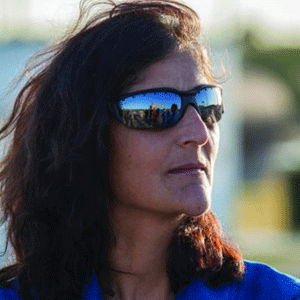- 150 W. University Blvd.
- Melbourne, FL 32901
- (321) 674-7190
- Campus Map
Sunita Williams
Bio
Sunita Williams '95 grew up with the dream to be a veterinarian. Inspired by her neuroscientist father and x-ray technician mother, she enjoyed studying the sketches of brains displayed in her house. However, her life took a different path after her older brother entered the U.S. Naval Academy. Following his lead, she graduated in 1987 with a bachelor’s degree in physical science.
Sunita was commissioned as an ensign in the United States Navy in 1987. She graduated from the Navy’s test pilot school in 1993 and returned as an instructor in 1995. After receiving her master of science degree in engineering management from Florida Tech in 1995, NASA selected her to be an astronaut in 1998.
Captain Williams has accrued an impressive amount of spacewalk time: she spent 50 hours and 40 minutes outside of the International Space Station (ISS); and in completing two missions to the ISS, she has spent over eleven total months orbiting Earth. Back on the ground, Captain Williams has continued her career in the space industry as a member of NASA’s Commercial Crew Transportation Capability, a group of veteran astronauts who work with privately held companies to develop spacecraft. Her contributions have helped to build the Boeing CST-100 Starliner and SpaceX Dragon. She is among four veteran astronauts chosen by NASA to fly the first commercial space vehicles.
“Space exploration makes us think outside the box; it makes us stretch our imaginations even further. Technology is nothing without imagination, and spaceflight imagination in the next generation is going to go really far,” she said.
Captain Williams is the recipient of the Navy Achievement Medal and the Humanitarian Service Medal. In 2007, she became the first non-Indian citizen to receive the Sardar Vallabhbhai Patel Vishwa Pratiba Award, given by the World Gujarati Society in India. Captain Williams received the Jerome P. Keuper Distinguished Alumni Award from Florida Tech in 2015.
Education
Florida Tech - B.S. in Physical Science '95


